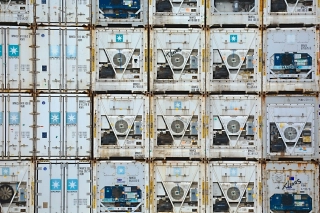Why Is It Worth Using Refrigerated Containers?

Refrigerated containers, also known as reefers, are a specialized type of container used for transporting and storing products that require specific internal conditions. They are equipped with a refrigeration unit that maintains a set temperature, whether below or above zero. Over recent years, their significance in global logistics has increased due to the recognized potential for fast transport of products (such as medicines and food), even over international distances.
Refrigerated containers are used across various industries where maintaining a constant temperature during storage or transport is crucial, such as:
Using refrigerated containers offers many benefits. They enable safe, flexible, and efficient logistics operations in a global economy where time, quality, and control are paramount.
Refrigerated containers are mobile and flexible – they can be easily transported using ships, trains, and trucks. Their standardized dimensions allow global transport without concern for size mismatches between regions. Container coolers can be placed anywhere as temporary cold storage, such as at a festival or for seasonal operations.
Supply Chain Continuity
Refrigerated containers provide stable temperature conditions at all times. They maintain a constant temperature for many days, regardless of the transport mode, and their cooling units operate with an accuracy of up to 0.5°C. These units are also equipped with GPS sensors and temperature recorders.
Security and Quality Maintenance
Mobile container coolers protect goods from moisture, contamination, external odors, and—most importantly—loss of quality. This significantly reduces product losses and claims.
Cost-Effectiveness
Compared to building a stationary cold storage facility, containers are cheaper and faster. They don't need to be purchased—you can rent them, which reduces costs. They're also easy to load and unload, making transport fast and standardized across all modes.
If you don’t need vast warehouse volumes that require the construction of a dedicated cold storage facility, a refrigerated container is an ideal choice. Its cost is much lower than a stationary cold store, and you can start with just one and scale up if needed. They can be placed virtually anywhere and moved at any time. Refrigerated containers are often available immediately. They can be powered from the grid or by a generator, making them suitable as both mobile and stationary cooling units.
Looking Ahead
Container transport continues to evolve, which means refrigerated containers are becoming an increasingly important element of the supply chain. The combination of technology and sustainability, along with rising demand, is key to the success of reefer containers in the future. The growing consumption of fresh products worldwide fuels the need for both short- and long-distance transport. Additionally, the increasing importance of vaccines and medications requiring controlled temperatures is driving the use of refrigerated containers in transport.
Transporting goods in refrigerated containers is a profitable investment—it's non-binding at the start and doesn’t require large financial outlays, while ensuring product quality at the end of the journey. You can increase or decrease the number of containers, offering great flexibility. Throughout the process, the customer maintains full control over their cargo.